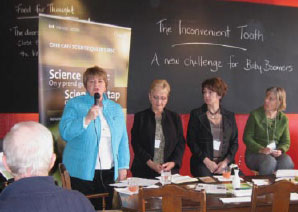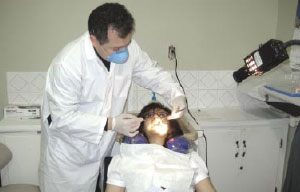The commitment of Dalhousie University's faculty of dentistry to improving access to care is visible in the innovative and supportive partnerships among dentists, dental hygienists, academics, care providers, policymakers and community members the faculty has established over the years. These partnerships are effective communities of practice that bring together a group of people who share a common concern or interest and who learn through interacting with each other.1 Communities of practice can take many forms, including voluntary informal networks, work-supported formal education sessions, apprentice training or multidisciplinary, multi-site project teams.2 Communities of practice can be a means of bridging the gap between researchers and the practitioners and policy-makers who make use of research outcomes,3 with knowledge transfer flowing in both directions. The process of knowledge transfer entails a complex series of actions that "encompasses all steps between the creation of new knowledge and its application to yield beneficial outcomes for society."4 Coalitions such as communities of practice in dental education and research may lead to new models of oral care that will help to alleviate the increasing demands placed upon our current systems of oral care.5
The Collaboration of Oral Health Researchers (COHR), a research group founded by Drs. Mark Filiaggi and Debora Matthews, has been a productive and dynamic community of practice since its early beginnings in 2004. The COHR mission is to improve the oral health of underserved populations and to build capacity for oral health-related research. Through the development of strong collaborative partnerships with decision-makers, stakeholders and the community, we are building necessary links between population needs assessment and delivery of oral health services.
 Ann McInnis (left) of Northwood Care with Drs. Joanne
Clovis, Debora Matthews and Mary McNally at the Café
Scientifique The Inconvenient Tooth: A New Challenge for
Baby Boomers.
Ann McInnis (left) of Northwood Care with Drs. Joanne
Clovis, Debora Matthews and Mary McNally at the Café
Scientifique The Inconvenient Tooth: A New Challenge for
Baby Boomers.
Concurrent with the creation of the COHR, we also began a significant and sustained partnership with the Atlantic Health Promotion Research Centre to create the Oral Health of Seniors research group. Over time, our coalitions have shared research knowledge and resources to form well-rounded and diverse groups with a common interest in increasing access to oral ealth care for vulnerable populations. Over the past 10 years, COHR researchers have been awarded over one million dollars of research and knowledge translation funding focusing on the oral health of older adults.
Recent COHR Research Communities
Community Engagement with Northwood CareOur first and most consistent community research partner has been Northwood Care, located in central Halifax. Northwood Care is a large private, not-for-profit continuing care organization with a rich history of community outreach and collaborative research. Northwood's involvement with oral health research began in 1999. With support from the Canadian Health Services Research Foundation, the COHR research team examined the continuity of oral health care and policies for Nova Scotia seniors. As part of this work, a 2-day national forum was held to identify research priorities and to develop strategies for financial, organizational and policy interventions and to strengthen partnerships.
Seniors Oral Health Assessment ProjectIn 2004, a workshop titled Oral Health Assessments for Seniors: Building Capacity for a Canadian Consensus was sponsored by the Canadian Institutes of Health Research (CIHR)'s Institutes of Musculoskeletal Health and Arthritis and the faculty of dentistry. Building on the success of earlier partnerships, the collaborative team expanded to include Health Canada's National Advisory Council on Aging, the Nova Scotia Department of Health, the Nova Scotia Senior Citizens' Secretariat, the Group of IX Nova Scotia Seniors' Organizations, long-term health care providers (including Northwood Care) and the Canadian and Nova Scotia dental and dental hygienists associations. A study was developed to pilot test tools to measure the oral health status and quality of life of Nova Scotia seniors, and to examine barriers to access to oral health care. Funding was awarded through the Nova Scotia Health Research Foundation Collaborative Health Research Program.
These early projects have resulted in rich and lasting partnerships that have evolved to include the following collaborative initiatives:
- 2005: At the 6th Annual Clinical Conference sponsored by the Northwood Foundation in Halifax, members of the COHR presented an overview of the Seniors Oral Health Assessment Project pilot survey. Caregivers were given an information package consisting of education materials on the provision of oral care.
- 2005–2006: An oral health policy scan and analysis funded by the Nova Scotia Department of Health was undertaken to develop policy recommendations and strategies for addressing the oral health needs of seniors in the province. The research and stakeholder workshop involving 36 participants resulted in clear recommendations that were subsequently presented to the Minister of Health.
- 2006: Building Capacity for Oral Health Research on Seniors in Atlantic Canada, a CIHR-sponsored workshop, included 40 stakeholders from Atlantic Canada. The results of this workshop led to the successful application of a CIHR operating grant and 1 of 4 seed grants awarded nationally for research addressing oral health disparities.
- April 2009: The partnership with Northwood Care resulted in a CIHR-funded Café Scientifique titled The Inconvenient Tooth: A New Challenge for Baby Boomers. This collaboration between Northwood and oral health researchers at Dalhousie brought the community together for a rich discussion of oral health challenges for the aging population.
 Dentist Ed Ghiabi and research assistant Amany Toma demonstrate
the set-up used for the TOHAP study at Townsview
Estates in Truro, Nova Scotia, in April 2009.
Dentist Ed Ghiabi and research assistant Amany Toma demonstrate
the set-up used for the TOHAP study at Townsview
Estates in Truro, Nova Scotia, in April 2009.
Current COHR Research Communities
The Oral Health of our Aging Population StudyUntil recently, there was no provincial data on the oral health of Nova Scotians, making it difficult to persuade policy-makers to change policy. To address this lack of data, Dr. Matthews initiated The Oral Health of our Aging Population (TOHAP) study with co-principal investigator Dr. Joanne Clovis. The aim of TOHAP study, a crosssectional population-based survey of 1200 adults aged 45 and older in Nova Scotia, is to gather information on the oral health of aging adults (rural, urban, community dwelling and those in long-term care) through a questionnaire and clinical examination. The data will allow comparisons between the oral health needs and expectations of the generation of the baby boomers and the generation that preceded them.
With support from provincial and national funding agencies as well as the Office of the Chief Dental Officer of Canada, the findings will contribute to our understanding of the oral health and the barriers to care for Nova Scotians aged 45 years and older. This research initiative is supported by a diverse group of stakeholders and has involved the active participation of private dental practitioners and long-term care providers. The 9-member collaborative research team will release its findings in 2010.
Increasing Capacity for Oral HealthOur experience with projects involving seniors is now providing a new focus for research outreach. The research project Increasing Capacity for Oral Health (ICOH) is a collaboration between clinician-researchers at Dalhousie and a diverse group of stakeholders in Newfoundland and Labrador who share an interest in building the necessary links between the assessment of oral health needs and the delivery of oral health services, particularly for vulnerable populations. The project lead is Dr. Clovis, with co-investigators Dr. Matthews and Dr. Stephen Bornstein, director of the Centre for Applied Health Research in St. John's, Newfoundland.
The overall goal of the project is to build an expanded stakeholder community in Newfoundland—including oral health care practitioners, seniors' groups, policy-makers and academics—who are keen to improve access to oral health care and to develop potential to measure and monitor oral health status in this province.
Ethics in an Aging Society and the Tri-facilities ProjectsEthics in an Aging Society is a qualitative research project that explores the experiences of personal care workers to better understand the ethical dimensions of mouth care in frail, dependent older adults. The Tri-facilities project is concerned with improving personal daily mouth care and oral disease prevention for older adults in rural continuing care settings on Nova Scotia's eastern shore. Research following from these 2 studies led by Dr. Mary McNally will ultimately inform policies and programs to promote better personal mouth care practices for dependent elders and to improve training and institutional care planning.
Conclusion
The COHR is clearly fulfilling its mandate, and along with its partners, has been awarded significant research funds to conduct projects aimed at improving the oral health of older adults. In every case the COHR research projects have been characterized by the development of strong collaborative partnerships, true communities of practice that are currently expanding to include research focused on immigrants and refugees and Aboriginal populations. Dr. Filiaggi envisions a future for the COHR that also includes an expanded research network involving other disciplines, partnerships with other relevant health and community organizations, mentoring programs, platforms to share resources and information, more emphasis on student research, and increased clinical research projects. The COHR is a unique group among Canadian faculties of dentistry. It will continue to generate more research communities of practice with a common interest in improving access to care for vulnerable populations.
THE AUTHORS
References
- Wenger E. Communities of practice: learning, meaning and identity. Cambridge, UK: Cambridge University Press; 2003.
- Li LC, Grimshaw JM, Nielsen C, Judd M, Coyte PC, Graham ID. Use of communities of practice in business and health care sectors: a systematic review. Implement Sci. 2009;4:27.
- McDonald PW, Viehbeck S. From evidence-based practice making to practice-based evidence making: creating communities of (research) and practice. Health Promot Pract. 2007;8(2):140-4.
- Canadian Institutes of Health Research. Knowledge translation strategy 2004-2009: Innovation in action. 2004. Available: www.cihr.ca/e/26574.html#defining (accessed 2010 March 3).
- O'Keefe J. Time for new models of care (editorial). J Can Dent Assoc. 2008;74(6):481.
